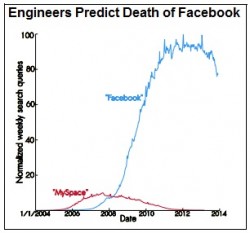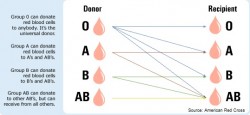 Here’s something you never heard at a recruiting conference: check your best candidate’s blood type before making an offer.
Here’s something you never heard at a recruiting conference: check your best candidate’s blood type before making an offer.
(You were expecting we’d start with the Facebook death thing? That’s what we call a teaser. Patience. It’s coming.)
If it’s B negative, you’ve got a pessimist on your hands. They might be the exactly right person for a job in disaster planning or safety officer; not so much for sales, unless fear of the failure they expect keeps them motivated.
How about an O? In the U.S., blood banks give those donors the top-tier treatment. In Japan, where this blood typing thing is totally out of control, Os are considered curious, generous, sociable, if a bit stubborn and flighty.
Ryu Matsumoto was forced to resign as a government minister after his intemperate remarks to the governors of two areas hardest hit by the earthquake and tsunami in 2011. He explained his comments this way: “My blood’s type B, which means I can be irritable and impetuous, and my intentions don’t always come across.”
Facebook Flu
 If you happen to have one of the “good” blood types, don’t forget to add it to your Facebook profile. (LinkedIn, too, but this part of today’s Roundup is about Facebook.) And hurry up about it because Facebook doesn’t have long to live.
If you happen to have one of the “good” blood types, don’t forget to add it to your Facebook profile. (LinkedIn, too, but this part of today’s Roundup is about Facebook.) And hurry up about it because Facebook doesn’t have long to live.
Just when recruiters were beginning to get the hang of using Facebook for sourcing, the social media site has become “infected.” In a widely discussed research paper, two Ph.D. students at Princeton say Facebook “is just beginning to show the onset of an abandonment phase.”
Now the two guys are in the department of Mechanical and Aerospace Engineering, but decided to explore the future of FB “by drawing analogy to the dynamics that govern the spread of infectious disease.”
“Ideas, like diseases, have been shown to spread infectiously between people before eventually dying out, and have been successfully described with epidemiological models,” wrote John Cannarella and Joshua A. Spechler.
Armed with data from Google Trends, they plugged it into the formulas epidemiologists use to predict and track disease outbreaks, which, in the interest of completeness, are included here.
“Extrapolating the best ?t model into the future,” conclude the two scholars, “suggests that Facebook will undergo a rapid decline in the coming years, losing 80 percent of its peak user base between 2015 and 2017.”
What does FB say about this? Basically, baloney. But it was said in such a cool way that it makes you wonder if Jimmy Fallon had a hand in writing the response. Here’s a sample, “Google Trends for ‘air’ have also been declining steadily, and our projections show that by the year 2060 there will be no air left.”